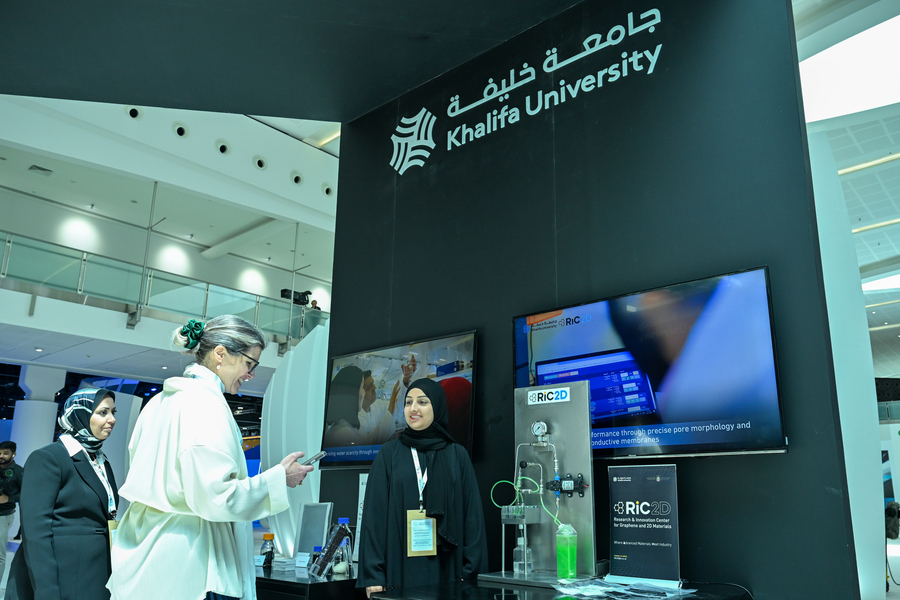First Time Distinction for Scientific Papers on Desalination from UAE Reiterates Masdar Institute’s Pioneering Contribution to Innovation
Abu Dhabi-UAE: 8 August, 2012 – Masdar Institute of Science and Technology, an independent, research-driven graduate-level university focused on advanced energy and sustainable technologies, today announced two papers co-authored by faculty members have become the most downloaded articles in the last three months from SciVerse ScienceDirect, a leading full-text scientific database.
This is the first time scientific papers on desalination submitted from the UAE have earned this distinction, further reiterating the pioneering contribution by Masdar Institute towards innovation of new technologies. ScienceDirect offers journal articles and book chapters from more than 2,500 peer-reviewed journals and over 11,000 books. The two papers have become the most downloaded among the papers published by leading publisher Elsevier in all scientific fields.
Both the papers were published in the international journal Desalination. The paper titled ‘Membrane distillation: A comprehensive review’ was co-authored by Dr Nidal Hilal, and Abdullah Alkhudhiri, a Ph D student working under the supervision of Dr Hilal, and Dr. Naif Darwish, was published in Desalination, Volume 287, 15 February 2012, (http://dx.doi.org/10.1016/j.desal.2011.08.027)
The paper titled ‘Techno-economic assessment and environmental impacts of desalination technologies’ was co-authored by Dr. Toufic Mezher, Dr Hassan Fath, Zeina Abbas, and Arslan Khaled, appeared in Desalination, Volume 266, Issues 1–3, 31 January 2011, (http://dx.doi.org/10.1016/j.desal.2010.08.035)
Dr. Fred Moavenzadeh, President, Masdar Institute, said: “The remarkable achievement reflects the extent of our faculty’s contribution towards leading the development of new technologies. The two papers have become the most downloaded in the most recent 90 days, a feat that is unsurpassed by any other paper submitted from the UAE. The faculty members deserve our commendation and we are confident these achievements will continue to keep Masdar Institute in the forefront of scientific innovations.”
Dr. Nidal Hilal, is a Professor in Nano-membranology and Water Technologies at Masdar Institute and the Editor-in Chief of Desalination, the international journal on the science and technology of desalting and water purification. Dr. Toufic Mezher is Professor and Head of Engineering Systems and Management program at Masdar Institute. His research interests include sustainable development, renewable energy policy, building knowledge-based economies and innovation systems, as well as knowledge management.
Dr. Hilal said: “The interest in desalination technologies is growing due to the fact that there is insufficient fresh water to meet the daily drinking and sanitation needs of all the earth’s inhabitants. Worldwide desalinated water supply must triple by 2020 to meet the demands of a growing human population. It is a fact now that desalination is a technology of choice, as the global water desalination market is expected to expand at a compound annual growth rate of 9.5% over the next 10 years.
“We are delighted to know that our work is cited and downloaded by other researchers and industrialists in the desalination community. This truly reflects Masdar Institute’s internationally leading research in water and desalination technologies. We hope our findings play significant role in providing clean water to humanity as 780 million – approximately one in nine on the planet – lack access to an improved water source.”
Dr. Toufic Mezher said: “The papers downloaded on an international level by academics, researchers, industrialists and students reflect the importance of the research and the findings for other researchers and industrialists, and therefore their significance to scientific and industrial communities. The most downloaded status also demonstrates that desalination is generating substantial interest among the scientific and industrial communities and the public, strongly indicating that it could be a viable option to the world that is severely suffering from lack of fresh water.”
The paper on ‘Membrane distillation: A comprehensive review’ addresses membrane characteristics, membrane-related heat and mass transfer concepts, fouling and the effects of operating condition. Membrane Distillation (MD) process has various applications, such as desalination, wastewater treatment and in the food industry.
The paper on ‘Techno-economic assessment and environmental impacts of desalination technologies’ presents a comprehensive review and assessment of desalination technologies such as thermal which includes multi-stage flash (MSF) and multiple effect distillation (MED), membrane reverse osmosis (RO), and hybrid (MSF/MED-RO). It also includes global desalination policies for the major user countries such as Saudi Arabia, the US, Spain, China and Kuwait, as well as more detailed analysis of desalination, cogeneration, and water situation in the UAE with recommendations on future policy.
SciVerse ScienceDirect database is the measure of papers’ importance, with statistics on papers and how many times they are cited or downloaded by academics, researchers and industrialists across the world. The database also has full information about the authors in terms of their research fields and how many times their work is cited, to grade them accordingly in the H-index. Each academic and researcher around the world has a H-index number; the highest the H-index number, the more cited the work of the researcher.
Established as an on-going collaboration with the Massachusetts Institute of Technology (MIT), Masdar Institute integrates theory and practice to incubate a culture of innovation and entrepreneurship, working to develop the critical thinkers and leaders of tomorrow. With its world-class faculty and top-tier students, the Institute is committed to finding solutions to the challenges of clean energy and climate change through education and research.






